Danleers
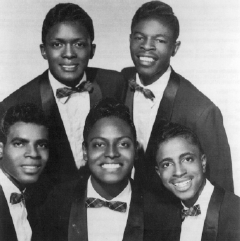
Top L to R Roosevelt Mays, Nat
McCune
Bottom L to R Willie Ephraim, Jimmy Weston, Johnny Lee
The Danleers formed while teenagers in Brooklyn in 1958. The
group's only big hit "One Summer Night" came the summer
of 1958. Written by the group's manager Danny Welch it featured
the lead voice of Jimmy Weston
Members -Mercury Records
Jimmy Weston - lead
Johnny Lee - first tenor
William Ephraim - second tenor
Nat NcCune - baritone
Roosevelt Mays - bass |
Members - Mercury Records
Jimmy Weston
Louis Williams - first tenor
Douglas Ebron - second tenor
Terry Williams - baritone
Frankie Clemons - bass replaced by
Bill Carey |
|
|
Artist Biography by Craig Harris
With their debut single "One Summer
Night," the Danleers became one of the most successful vocal
groups of the late '50s. Written by the group's
songwriter/manager Danny Webb and recorded during their first
recording session, the tune reached the pop Top Ten and sold over
a million copies. The Danleers were one of many vocal groups that
arose out of the street corners, playgrounds, and tenement
hallways of Brooklyn. Originally a quintet, featuring lead singer
Jimmy Weston, baritone singer Nat McCune, bass vocalist Roosevelt
Mays, and tenors Johnny Lee and Will Ephraim, the band's sound
was reinforced by the addition of Webb.
Initially released on the Amp-3 label, "One Summer
Night" quickly became a local hit and attracted the
attention of Mercury, who reissued the tune in June 1958.
After performing at Alan Freed's Labor Day Extravaganza at the
Brooklyn Fox Theater, the Danleers were invited to join Frankie
Avalon, Bobby Darin, Eddie Cochran, Connie Francis, Dion &
the Belmonts, Buddy Holly & the Crickets, Clyde McPhatter,
and the Coasters in a nationally touring road show.
"One Summer Night" marked the last success for the
Brooklyn-based group, however. After three attempts to recapture
the momentum of "One Summer Night" failed, the group
was dropped by Mercury. Reorganized, with different personnel, by
Weston, the Danleers released two singles in the mid-'60s that
failed to revive their early success.
Jimmy Weston died June, 1993
Willie Ephraim died October 15, 1998 at the age of 69.
Dells
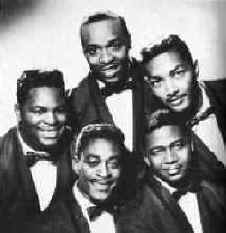
Clockwise from top: Chuck Barksdale, Mike
McGill, Vance Allison, Johnny Carter, Marvin Junior
One of the most durable acts in vocal group history, the
Dells stayed together for for thiry-five years with only one
member change
Members:
Johnny Funches - lead - replaced by Johnny
Carter 1958
Marvin Junior - first tenor
Verne Allison - second tenor
Lucius McGill - baritone - replaced by Mickey
McGill
Chuck Barksdale - bass replaced by Calvin
Carter
After nearly four decades of recording an
incredible legacy of hits, The Dells have made only one personnel
change in their entire professional career. Perhaps that's why
the venerable R&B vocal group can boast such a remarkably
consistent track record. The quintet from Chicago's south suburbs
has weathered stylistic shifts from doo-wop and soul to disco and
urban contemporary, and every permutation in between. Their
harmony remains as striking as ever, with Marvin Junior's
earthshaking lead enduring as the group's focal point. Signing
with Vee-Jay in 1955, their creamy vocal blend on "Oh,What a
Night" gave The Dells their first major R&B hit the next
year, but it would be nearly a decade before they returned to the
winner's circle with another dreamy classic, "Stay in My
Corner." By then Chicago's R&B sound had changed
drastically -- doo-wop was dead and soul was king -- but The
Dells adapted effortlessly, regularly scaling the charts for the
Chess subsidiary Cadet with "There Is," "Always
Together," "Give Your Baby a Standing Ovation,"
and a marathon remake of "Stay in My Corner" that
afforded Junior's booming baritone room to roam. Seemingly an
indestructible force (turning up on the R&B charts as
recently as 1984), the succinct harmonies of The Dells span
entire generations of R&B history. ~ Bill Dahl, All-Music
Guide
The Dells were inducted into the Rock and Roll Hall of
Fame in 2004
The Dells were inducted into the Vocal Group
Hall of Fame in 2004
Marvin Junior died May 29, 2013, he was 77.
Chuck Barksdale died May 15, 2019, he was 84.
Johnny Carter died August 21, 2009, he was 75.
The
Del-Satins
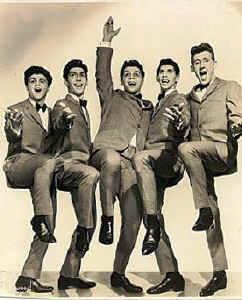
(L-R) Keith Koestner, Tommy Ferrara, Stan Ziska, Freddy Ferrara,
Leslie Cauchi
The Del Satins were one of the best white male doo wop groups.
Members:
Stan Ziska - lead
Les Cauchi - first tenor
Keith Koestner - second tenor
Freddy Ferrara - baritone
Tommy Ferrrara - bass
R&B artists the Del-Satins had few peers as
practitioners of white doo-wop in the 60s. They were formed in
1958 in Manhattan, New York, USA, by Stan Ziska (lead), Fred
Ferrara (baritone), his brother Tom Ferrara (bass), Leslie Cauchi
(first tenor) and Bobby Fiela (second tenor). The Del-Satins was
chosen as their name in open tribute to their principal
influences, the Dells and Five Satins. Under the new name they
secured a recording contract with End Records.Their debut
single, ‘I’ll Pray For You’, was released in 1961.
New management was sought with Passions manager Jim Gribble, who
found them a more permanent contract at Laurie Records. Their
label star Dion was at the time grappling with diminishing chart
returns after an impressive start, and wanted to replace his
existing backing band, the Belmonts, with a ‘rockier’
troupe. The Del-Satins were instantly sent to work on Dion’s
new song, ‘Runaround Sue’, a two-week number 1 in the
Billboard charts. Although their contribution to the hit was
substantial, the Del-Satins received none of the credit. They
stepped out on their own for ‘Counting Teardrops’ for
Winn Records, before reuniting with Dion for ‘The
Wanderer’, which stalled just one place short of the number
1 spot in the US charts. The follow-up, ‘Lovers Who
Wander’, peaked at number 3, emphasizing the power of the
Dion/Del-Satins coalition. While the combination was charting
once more with the kazoo-led ‘Little Dianne’, the
Del-Satins released ‘Teardrops Follow Me’, their first
own-name outing to garner serious sales, after which they found
regular work on television (Alan Freed) and radio (Freed and
Murray The K). Back with Dion for the number 5 ‘Love Came To
Me’, the Del-Satins’ own ‘Does 'My Love Stand A
Chance’ did not fare well. In 1962 they moved to Columbia
Records as part of Dion’s new contract, which began with a
version of the Drifters’ ‘Ruby Baby’, another
substantial hit at number 2. Still frustrated by their lack of
recognition, in 1963 the Del-Satins auditioned for Phil Spector
but declined his subsequent invitation to record with him.
Meanwhile, in appreciation for their past efforts on his behalf,
Dion wrote a song for the Del-Satins for single release,
‘Feeling No Pain’, but without his name to accompany it
there was no chart return. Two more hits with their mentor
followed, ‘Donna The Prima Donna’ and ‘Drip
Drop’, before new manager Jay Fontana found the group a home
at Mala Records. This relationship lasted for only one single,
‘Two Broken Hearts’, before three more efforts at B.T.
Puppy Records. These included a rendering of the Drifters’
‘Sweets For My Sweet’, but afterwards Ziska left (for
the Magnificent Men) and was temporarily replaced by Carl Parker.
In 1966 the Vietnam War robbed the group of Cauchi and Tommy
Ferrara, but the Del-Satins continued to play live with the
addition of Richard Green, Mike Gregorio and Johnny Maestro
(ex-Crests). When Cauchi returned he and the Del-Satins became
Brooklyn Bridge. In 1991 the original Del-Satins re-formed for
nostalgia shows.
Fred Ferrara died October 21, 2011, he was 71.
Leslie Cauchi died March 3, 2005, he was 77.
Dubs
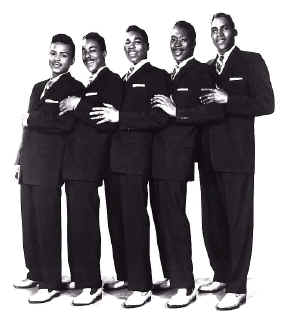
Left to right: William Carlise, Richard Blanton, Tommy Grate
Cleveland Still, James Miller
The Dubs were the outgrowth of two fine but short
lived mid-50s rhythm and blues groups, the 5 Wings and the
Scale-Tones.
Members:
Richard Blandon - lead
Cleveland Still - first tenor
Cordell Brown - second tenor - replaced by
William Carlisle
Tommy Grate - bass
James Miller - baritone
The Dubs made one of the mid-'50s' more endearing
ballad records, "Could This Be Magic," in 1957. It
wasn't a huge hit, but still became a doo wop classic. The group,
featuring lead vocalist Richard Blandon, continued recording for
Gone, Musictone, ABC, End, Josie, Wilshire, Lana, Candlelite,
Johnson, and Clifton through the mid-'70s, but never enjoyed any
success or made any headway outside doo wop circles. ~ Ron Wynn,
All-Music Guide
Tommy Grate died January 20, 2018.
Duprees
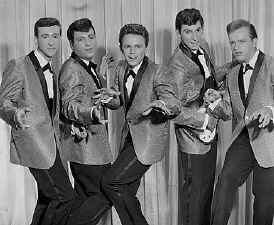
From the left: John Salvato, Mike Arrnone,
Joe Canzano, Joe Santollo, Tom Bialaglow, 1962
The Duprees made every ballad sound like an old standard
Members:
Joe Vann - lead - replaced by Mike Kelly
Joe Santollo - first tenor
John Salvato - second tenor
Mike Arnone - baritone
Tom Bialaglow - bass
One of the final Italian doo wop groups to make a
wave in the early '60s, the Duprees were in some senses not a
rock & roll act at all. They relied on updates of pre-rock
pop standards for most of their material, dressed up in classy
big-band arrangements. Their New Jersey street-corner roots were
still audible in their doo wop harmonies, giving their treatments
of moldy oldies enough of a contemporary flavor to compete in the
rock and pop marketplace. They were very good at what they did,
and in 1962-63, they were very successful: "You Belong to
Me" (previously recorded by Jo Stafford, Patti Page, Dean
Martin, and Joni James) made the Top Ten, and "My Own True
Love" (from the soundtrack of Gone with the Wind),
"Have You Heard," and "Why Don't You Believe
Me" were also Top 40 hits. The Duprees were already retro
when they were at their peak, and were washed out by the British
Invasion, although they continued to record throughout the late
'60s, sometimes in a Jay & the Americans/Vogues style. ~
Richie Unterberger, All-Music Guide
The Duprees were inducted into the Vocal
Group Hall of Fame in 2006
Joe Santollo died of a heart attack June 4, 1981
Joey Vann died of a heart attack February 24, 1984
Mike Arnone died October 27, 2005
Earls
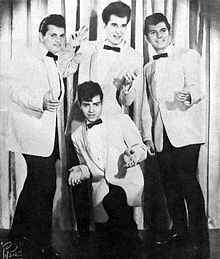
Back L to R: Robert Del Din, John Wray,
Eddie Harder
Bottom: Larry Chance
A truly innovative group, the Earls interepted rhythm
and blues ballads in their own rock and roll style
Members:
Larry Chance (real name Larry Figueiredo) -
lead
Robert Del Din - first tenor replaced by
Ronnie Calabrese
Eddie Harder - second tenor
Lary Palumbo - baritone
John Wray - bass - replaced by Bob Moricco
Among the more revered white doo wop groups, the
Earls began as the High Hatters. They formed in 1957 at the
Tecumseh Social Club in the Bronx. Lead vocalist Larry Figueiredo
changed his name to Larry Chance; he was joined by Bob Del Din,
Eddie Harder, Larry Palumbo, and Jack Wray. They started
recording for Rome in 1961. They scored their lone hit in 1963
with "Remember Then" for Old Town. It barely cracked
the R&B Top 30 (number 29), but they continued until 1970,
when they disbanded. The Earls gave it another try in 1975 with
Chance on board again, this time singing with Ronnie Calabreese
and Tony Olbert.
John Wray died November 30, 2020, he was 81.
Larry Chance died September 6, 2023, he was 82
Nino
and the Ebb Tides
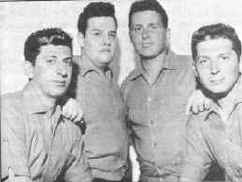
One of the first purveyors of rock nostalgia, Nino and the Ebb
Tides started as the Ebbtides from the Bronx, in 1956
Members:
Antonio Aiello - lead
Tony Delesio - baritone -replaced by
Ralph Bracco (tenor) - replaced by Tony BiBari 1960
Vinnie Drago - bass
Rudy ? - replaced by Tony Imbimbo (baritone)
Formed in the Bronx, New York, USA, the Ebb Tides
(as they were originally called) featured classmates Antonio
‘Nino’ Aiello (lead), Tony Delesio (baritone), Vinnie
Drago (bass) and Rudy (tenor). Their recording debut,
‘Franny Franny’, came after meeting talent scout Murray
Jacobs in 1957. By the end of the year they had extended their
title to Nino And The Ebb Tides and transferred to Recorte
Records. Their second single, ‘Puppy Love’, saw Delesio
and Rudy replaced by Tony Imbimbo (baritone) and Ralph Bracco
(tenor). This sold well in the New York area, but, like its
successors, ‘I’m Confessin’’ and
‘Don’t Look Around’, it failed to make any
national headway. In 1960 Tony DiBari replaced Bracco and the
group moved to Marco Records. This resulted in only one single,
‘Someday’, before they joined Madison Records. Their
first effort for Madison was a version of ‘Those Oldies But
Goodies (Remind Me Of You)’, but its impact was dulled by a
competing version by Little Caesar And The Romans. The Ebb Tides
followed up with another nostalgic doo-wop record, ‘Juke Box
Saturday Night’. This at last brought them mainstream
success. Like its predecessor, it used snatches of familiar
doo-wop classics in the background, and peaked at number 57 in
the US charts. Despite the breakthrough, Madison was suffering
financial difficulties and the Ebb Tides moved on again, this
time to Mr Peacock Records. However, ‘Happy Guy’ failed
to chart, though more damaging was the group’s decision to
pass on a song written by Ernie Maresca, ‘The
Wanderer’, which became a massive seller for Del-Satins. The
Ebb Tides folded in 1965 after a handful of singles for ever more
obscure labels. They did reunite in 1971, however, and again in
the 80s for a series of 50s revival show
Edsels
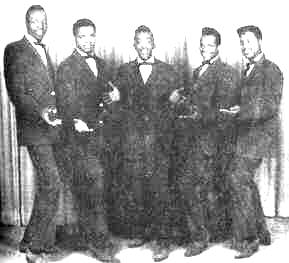
L to R: Marshall Sewell, Larry Green, George Jones
Jr., Harry Green, and James Reynolds
If you don't succeed now, pray someone plays your record later,
is a bit of advice that would have been prescient for the Edsels.
Members:
George Jones Jr. - lead
Larry Green - first tenor
Harry Green - baritone
James Reynolds - second tenor
Marshall Sewell - bass
A brief encounter with fame came for the Edsels
when they recorded the doo wop masterpiece "Rama Lama Ding
Dong." Originally released in 1959, the single became a hit
some three years after its initial release, thanks to the efforts
of diligent record collectors and disc jockeys.
Taking their name from Ford's legendary failed automobile, the
Edsels formed in the tiny mill town of Campbell, OH, in the late
'50s. The group consisted of lead vocalist George Jones, Jr.,
James Reynolds, Marshall Sewell, Harry Greene, and Larry Greene.
The group auditioned for a local Ohio music publisher in 1958.
Through the publisher, the group landed a record deal with the
small Dub Records. The Edsels' first single was a song Jones had
written, "Rama Lama Ding Dong." The first pressings on
Dub Records were mislabeled "Lama Rama Ding Dong."
"Rama Lama Ding Dong" became a local hit, but made no
impact nationally. In 1961, disc jockeys began playing the song
again because it sounded similar to the Marcels' current hit,
"Blue Moon." Within a few months, the single was
re-released on Twin Records -- this time with the correct song
title -- and it quickly scaled the pop charts, peaking at number
21. Ironically, the group had broken up by the time "Rama
Lama Ding Dong" became a hit in 1961.
George Jones Jr.died September 5, 2008. he was 71
Elegants

(clockwise from top) Frank Fardogno,
Carmen Romano, Jimmy Moschella, Vito Picone, Artiie Venosa
A Mozart melody became an inspiration for these five singing
teenagers in Staten Island, New York
Members:
Vito Picone - lead
Artie Venosa - first tenor
Frank Fardogno - second tenor
Carman Romano - baritone
Jimmy Moschella - bass
This New York doo wop group earned notoriety for
their masterpiece "Little Star" in 1958, which topped
both R&B and pop charts. They were a White ensemble led by
Vito Picone, With Arthur Venosa, Frank Tardogno, Carmen Romano,
And James Mochella. All had been in other groups before uniting
as The Elgins. They continued recording for Hull, United Artists,
Limelight, Photo, IPG, and Laurie through the '50s, '60s and into
the '70s, but never had another hit, despite cutting a number of
solid ballads. There were two other editions in the mid-'60s,
Vito Piccone with the Elegants and Vito & The Elegants. ~ Ron
Wynn, All-Music Guide
Carman Romano died Agust 2, 2016, he was 77
Artie Venosa died April 20, 2018
Eternals
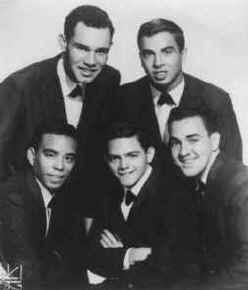
Top Row (L-R) Fred Hodge and Ernie Sierra
Bottom Row (L-R) Alex Miranda, Anibal Torres, Charlie Girona
The Eternals were a novelty-record vocal act with a Latin styling
Members:
Charlie Girona - lead
Fred Hodge - first tenor
Ernie Sierra - second tenor
Arnie Torres - baritone
Alex Miranda - bass
Artist Biography by Bryan Thomas
These Eternals were a vocal group who scored big with
"Rockin' in the Jungle"; the "other" Eternals
were based in Winnipeg, Manitoba, and recorded several cover
songs that became Canadian hits in the late '60s.
The Eternals formed during the late '50s, in the Freeman Street
neighborhood of the Bronx, where the quintet -- Charlie Gerona on
lead, Fred Hodge on first tenor, Ernie Sierra on second tenor,
Arnie Torres on baritone, and Alex Miranda on bass -- started out
singing in junior high school as the Gleamers, cutting their
teeth on covers by the Flamingoes and the Spaniels; Gerona,
meanwhile, was crafting songs in the humorous pop tradition of
the Coasters, the Cadets, and the Olympics. Soon the Gleamers
were calling themselves the Orbits, and developing a sound all
their own. A novelty Gerona penned for the holidays,
"Christmas in the Jungle," which came complete with
jungle sounds and bird calls (mostly done by Torres) received
airplay from the Murray the K and WABC's disc jockey Bruce
Morrow's shows and soon became their calling card.
Their new manager, Bill Martin, a friend of Morrow's, then turned
them on to Melba Records chief Morty Craft, who put the group in
Beltone Studios in late spring of 1959 to record the song, which
by now had been changed to "Rockin' in the Jungle." The
group also felt that a new name was in order and crowned
themselves the Eternals, no doubt hoping for everlasting success.
"Rockin' in the Jungle" was released in early summer on
Craft's new Hollywood Records label, becoming an immediate hit in
New York (number 11 locally). On July 13th, the song hit
Billboard's national Pop Charts, where it lodged at number 78.
The Eternals' second novelty release -- "Babalu's Wedding
Day" -- was just starting to break, when the Etemals'
manager felt compelled to sue shady booking agents who were
apparently attempting a less-than-ethical move on the group. As a
result of the court case, "Babalu's" distribution was
stopped and the Eternals were denied their shot at stardom. (The
single became a jingle on WABC disc jockey Bob Lewis' radio show
and helped kept the group's image alive for years to come).
In January 1961, the Eternals' last single was issued through
Morty Craft's Warwick Records. The A-side was written by new
member George Villanueva, who also sang lead, and should have
been a hit but more legal entanglements kept the record from
charting. The group disbanded in 1962, but by 1972 they
re-emerged for a show at the Academy of Music (the lineup now
featured Ernie Sierra, George Villanueva, Arnie Torres, Richard
Sierra, and Hector Garcia). Another lineup -- Sierra, Villanueva,
Herman Velez, Tito Santiago, and Freddie Clavel -- are still
going strong today on the oldies circuit.










